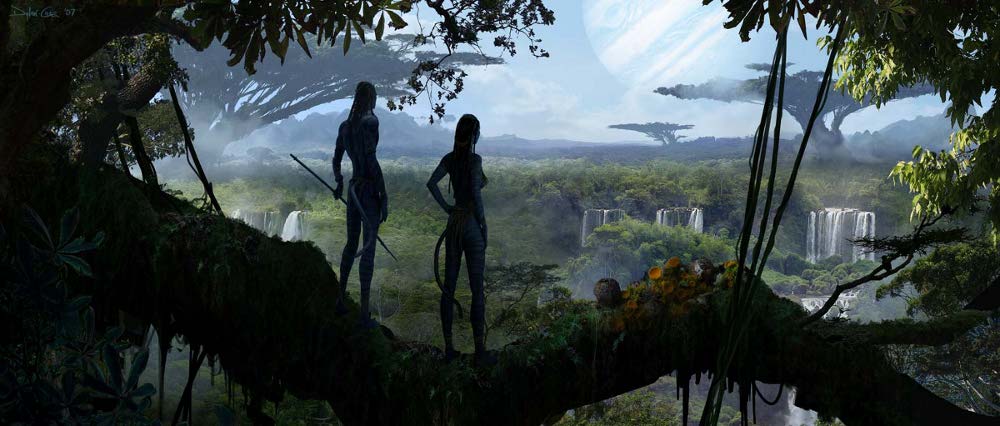AVATAR: Creation, Shortsighted pt 1
 In my introductory post on AVATAR, it was mentioned that some moviegoers are reportedly “suffering from “Avatar blues”, surrounded by the glorious 3-D world James Cameron and a team of visionaries designed as a feast for the senses and leaving with a reality-crashing sense of dissatisfaction and loss. One online forum administrator is quoted as saying “the movie was so beautiful and it showed something we don’t have here on Earth. I think people saw we could be living in a completely different world and that caused them to be depressed.”
In my introductory post on AVATAR, it was mentioned that some moviegoers are reportedly “suffering from “Avatar blues”, surrounded by the glorious 3-D world James Cameron and a team of visionaries designed as a feast for the senses and leaving with a reality-crashing sense of dissatisfaction and loss. One online forum administrator is quoted as saying “the movie was so beautiful and it showed something we don’t have here on Earth. I think people saw we could be living in a completely different world and that caused them to be depressed.”
The story’s protagonist, Jake Sully, leaves his broken and empty life behind, and finds himself on a world where – unless you’re an alien – the world seems like a syncopated paradise. When he encounters the Na’vi, they go further to instruct him in their world’s way of existence and the added layer of “interconnectedness” with nature, culminating in the worship of mother goddess Eywa. But wait – back the Titanothere up – before the film goes on to promote parallel ideas with paganism and mother-earth worship, is there a felt loss that may be real, a wonder which both Jake and the viewers are keying in to?
And the Lord God planted a garden in Eden, in the east, and there he put the man whom he had formed. And out of the ground the Lord God made to spring up every tree that is pleasant to the sight and good for food. The tree of life was in the midst of the garden… – Genesis 2:8-9
 At a base level, Christians DO connect with a garden paradise existence with a big sustaining tree at its center. Such images may turn up in pagan traditions, but they don’t own the origin, and there is also a sense of loss and brokenness over the real fact that sin – human evil – shattered this reality a long time ago. Although Avatar may layer wild sci-fi ideas with touches of Hinduism and other religions, this essential basis echoes with a truth that – if not for sin – “we could be living in a completely different world”.
At a base level, Christians DO connect with a garden paradise existence with a big sustaining tree at its center. Such images may turn up in pagan traditions, but they don’t own the origin, and there is also a sense of loss and brokenness over the real fact that sin – human evil – shattered this reality a long time ago. Although Avatar may layer wild sci-fi ideas with touches of Hinduism and other religions, this essential basis echoes with a truth that – if not for sin – “we could be living in a completely different world”.
In other words, “blue” moviegoers… your feelings are actually understandable and connected to a loss much deeper than the end of a 3-D glasses and IMAX experience. Better yet, there IS a solution for that loss, but more on that later.
When humans should have become as perfect in voluntary obedience as the inanimate creation is in its lifeless obedience, then they will put on its glory, or rather that greater glory of which Nature is only the first sketch. – C.S. Lewis
Worshipping created things is certifiably sinful, and Avatar’s example of nature worship and nature/goddess may lead anchor-less viewers down the same path the fruity Force did in Star Wars. Still, some Christians too easily dismiss the film’s reveling in creation and forget how – in reality – the Creator does reveal himself through creation. As Jake explores the lush Pandoran landscape, with gorgeous popping plants, phosphorescent flora and elegant animals, I found myself refreshed in my desire to appreciate God’s creation. Men of faith like C.S. Lewis and even the great reformer Martin Luther did not miss this:
God writes the Gospel, not in the Bible alone, but also on trees, and in the flowers and clouds and stars. – Martin Luther
![]() There seem to be a lot of conservative Christ-professing fundamentalists who don’t give a crap about the creation, complaining about tree-huggers and redefining dominion as “right-to-pillage” instead of responsibility to steward. Just as bad, even a lot of urban hipster Christians are equally dismissive of God’s wondrous handiwork, save for occasional lip service. I’ve been guilty of this for years, preferring four walls and my computer screen to a glorious, God revealing sunny day (to web-surfing addict: repent and go outside now). Even in a broken world with pain and suffering, God’s artistry and fingerprints are present:
There seem to be a lot of conservative Christ-professing fundamentalists who don’t give a crap about the creation, complaining about tree-huggers and redefining dominion as “right-to-pillage” instead of responsibility to steward. Just as bad, even a lot of urban hipster Christians are equally dismissive of God’s wondrous handiwork, save for occasional lip service. I’ve been guilty of this for years, preferring four walls and my computer screen to a glorious, God revealing sunny day (to web-surfing addict: repent and go outside now). Even in a broken world with pain and suffering, God’s artistry and fingerprints are present:
“Some people, in order to discover God, read books. But there is a great book: the very appearance of created things. Look above you! Look below you! Read it. God, whom you want to discover, never wrote that book with ink. Instead He set before your eyes the things that He had made. Can you ask for a louder voice than that?” – St. Augustine
Decades ago, James Cameron directed a film about aggressive human terraformers and marines who go in to conquer an alien landscape. Indigenous or not, resident Aliens push back hard, so the conquering humans not only kick the Queen Mother’s thorax with a mech suit, they take joy as they “nuke the place from orbit”. Go humans GO! Now, after a few decades of exploring God’s creation, James Cameron may be no closer to acknowledging God’s existence, but he has shifted his love from bootstrapping men to the beauty of God’s handiwork. Avatar feels like a full reversal in narrative approach – from “survival of the fittest” to stewardship and awe?
(We’ll explore more on the source of this awe in the next post – click here)


